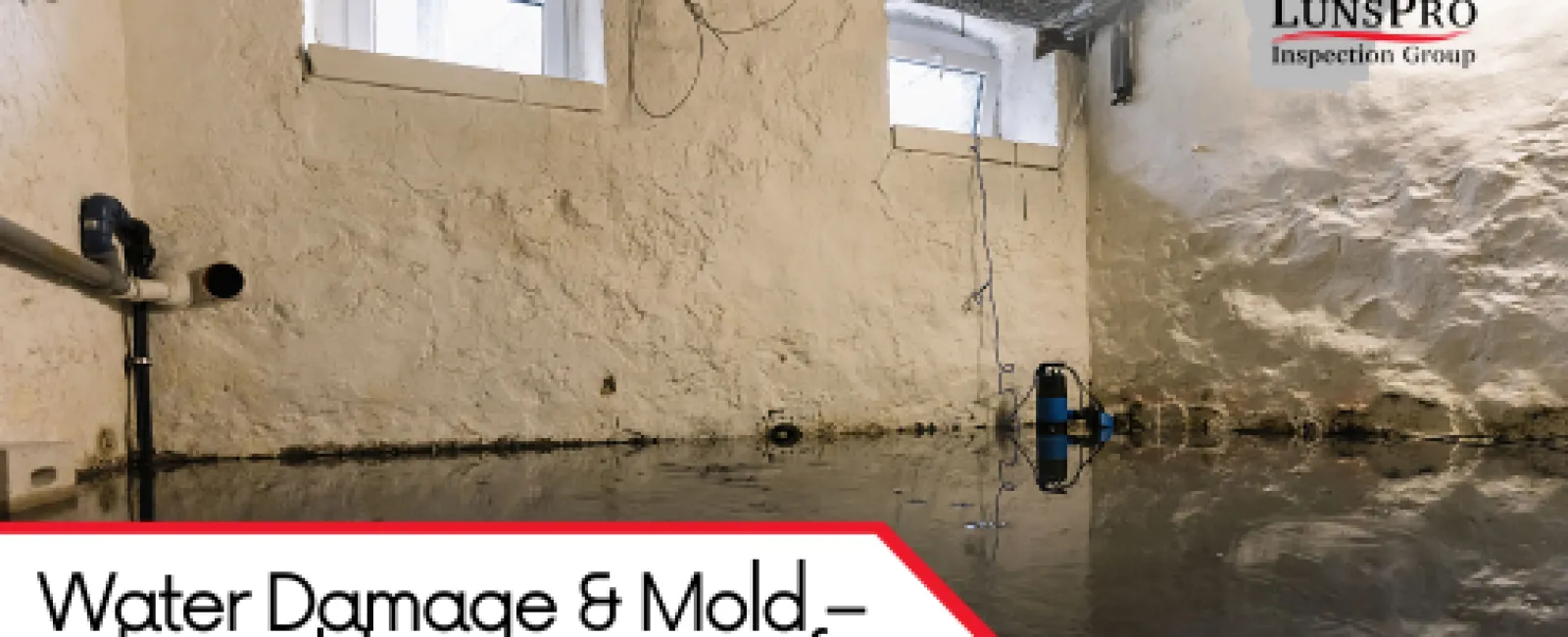Summer storms are a common part of life in the Southeast, especially across Charlotte, Greensboro, and Raleigh. With heavy rains, flash flooding, and high humidity, homeowners often worry about roof leaks, flooding basements, and water pooling in yards. But beyond the visible damage lies an even greater and more insidious threat: mold. As these storms continue to sweep through the Triad and Triangle Areas, many homes face long-term issues that may not be apparent until significant damage has already been done.
From a compromised roofline to saturated crawl spaces, the risk of foundation deterioration increases dramatically when water is left unmanaged. And mold—triggered by even small leaks—can spread silently behind walls, ceilings, and floorboards, threatening both property and health. That's why proactive, professional inspection services like those offered by LunsPro Inspection Group are essential for maintaining the integrity of your home.
In this article, we'll explore how summer storms contribute to water damage and mold growth, how these issues impact your home's foundation, and what you can do to protect your property with regular Carolina home inspections.
Why Summer Storms Are Especially Problematic in the Carolinas
The Carolinas are known for their intense summer weather. Afternoon thunderstorms, remnants of tropical systems, and sudden downpours can all contribute to dangerous water intrusion. While rain might seem harmless at first glance, prolonged exposure to water in vulnerable areas of your home creates the perfect environment for structural issues and microbial growth.
1. High Rainfall and Poor Drainage
In areas like Charlotte, Greensboro, and Raleigh, rapid development has resulted in many homes with insufficient grading or inadequate stormwater management. Water tends to pool around foundations, seep into crawl spaces, or overwhelm sump pumps, setting the stage for damage below the surface.
2. Humidity Accelerates Mold Growth
Even when your home avoids standing water, high humidity during the summer can be enough to trigger mold colonies. Mold thrives in warm, damp conditions—making the Triad and Triangle Areas prime environments for spores to spread, particularly in poorly ventilated areas such as attics, basements, and closets.
The Link Between Water Damage, Mold, and Foundation Issues
Many homeowners focus on mold as a health hazard—which it is. But what's often overlooked is how mold and moisture directly impact a home's foundation. Excess water doesn't just rot wood or stain drywall—it disrupts the balance beneath your home.
1. Hydrostatic Pressure and Foundation Cracks
As stormwater saturates the soil surrounding your home, pressure builds up around the foundation walls. This hydrostatic pressure can cause cracking in basements and slabs, especially if the concrete is older or unsealed. These cracks not only allow more water to enter but also weaken the structural integrity of the home.
2. Crawl Space Condensation and Wood Rot
Homes in Raleigh often undergo Residential and Commercial Inspections, which frequently include crawl space evaluations. In the humid Carolina climate, these spaces are breeding grounds for mold and rot. When warm, moist air infiltrates a cool crawl space, condensation forms. This can lead to:
-
Sagging floor joists
-
Compromised insulation
-
Mold-covered subflooring
-
Structural instability
Over time, this degradation can cause floors to become uneven, walls to crack, and doors to jam—symptoms many homeowners may mistakenly attribute to aging rather than hidden water damage.
Hidden Signs of Water and Mold Damage
Many homeowners are unaware of the early warning signs of water damage and mold until the issue has spread significantly. Some signs are visible; others are only detectable by a trained professional using specialized equipment like thermal imaging cameras or moisture meters.
Common Visible Signs:
-
Musty odors in rooms or crawl spaces
-
Stains or discoloration on ceilings and walls
-
Warped or buckling floors
-
Condensation on windows
-
Peeling paint or wallpaper
Subtle Indicators Found During Inspection:
-
Elevated indoor humidity levels
-
Hidden mold behind drywall or under flooring
-
Slow leaks in HVAC systems or water lines
-
Moisture intrusion around window and door frames
-
Poor attic ventilation leading to condensation buildup
Routine inspections by LunsPro Inspection Group in the Charlotte, Raleigh, and Greensboro regions often uncover these hard-to-detect problems—especially in homes built before modern building codes mandated more advanced moisture barriers.
The Health Hazards of Mold Growth
While structural damage is a concern, mold also presents serious risks to health. In homes with vulnerable residents—such as children, seniors, or individuals with respiratory conditions—mold spores can trigger:
-
Asthma attacks
-
Allergic reactions
-
Chronic sinus infections
-
Headaches and fatigue
-
Irritation of eyes, nose, and throat
Even if mold is not visible, it can lurk in air ducts or under floors, silently affecting indoor air quality. Carolina home inspections that include air quality or mold testing are critical for identifying these threats early on.
How LunsPro Inspection Group Protects Your Home
At LunsPro Inspection Group, we understand the regional challenges of living in the Carolinas. That's why we offer detailed inspection services designed to identify and mitigate water and mold issues before they compromise your home.
1. Comprehensive Water Intrusion Evaluation
We inspect basements, attics, crawl spaces, foundations, and roofing systems to detect signs of water penetration, leaks, or improper drainage. Our inspectors are trained to identify both visible damage and less obvious indicators of water intrusion using tools like moisture meters and thermal cameras.
2. Mold & Air Quality Testing
If mold is suspected, our team can conduct air sampling and surface testing to determine the type and concentration of mold present. These results help homeowners understand whether mold remediation is necessary and to what extent.
3. Foundation and Structural Review
We assess the foundation for signs of cracking, movement, or water-induced damage. Our detailed reports help property owners plan repairs early—before they escalate into more expensive or dangerous problems.
4. Seasonal Inspection Services
We recommend that homeowners in the Triad and Triangle Areas schedule inspections at the start and end of summer to evaluate damage caused by storms and humidity. Prevention is far more affordable than repair.
Proactive Steps Homeowners Can Take
While professional inspections are critical, there are several actions homeowners can take to prevent or minimize the impact of summer storm damage and mold.
-
Ensure gutters and downspouts are clean and directing water away from the home
-
Check for signs of water pooling near your foundation after rain
-
Use dehumidifiers in basements and crawl spaces
-
Seal basement walls with waterproofing paint
-
Inspect the attic for proper ventilation and signs of moisture
-
Trim vegetation near exterior walls to improve airflow and reduce moisture buildup
Simple maintenance and awareness go a long way, but these efforts work best when paired with a comprehensive inspection by a certified expert.
Don't Wait for the Mold to Spread
The hidden nature of water and mold damage makes them particularly dangerous. By the time visible signs appear, the problem may already be extensive—and expensive. And in a region like the Carolinas, where summer storms are fierce and humidity is high, ignoring the issue isn't just risky—it's costly.
Foundation damage, structural degradation, and long-term mold exposure can turn a dream home into a financial drain. That's why proactive homeowners in Charlotte, Greensboro, and Raleigh are turning to LunsPro Inspection Group for their Carolina home inspections. Our team offers the expertise, tools, and regional knowledge needed to uncover threats and preserve your investment.
Peace of Mind Starts with a Professional Inspection
If your home has recently experienced heavy rain, flooding, or unusual humidity levels, don't wait. The sooner issues are identified, the easier and more affordable they are to resolve. From waterproofing recommendations to mold detection, LunsPro Inspection Group provides thorough, unbiased inspections that empower homeowners with the information they need to take action.
Water damage and mold don't wait until you're ready—they move quickly, quietly, and persistently. But with the right inspection partner, you can stay ahead of the problem and enjoy your home with confidence—rain or shine.

